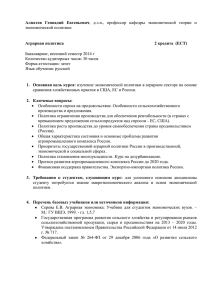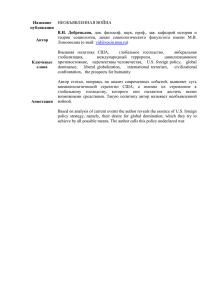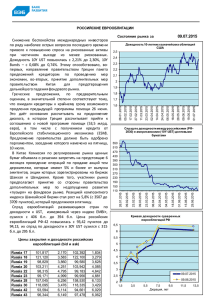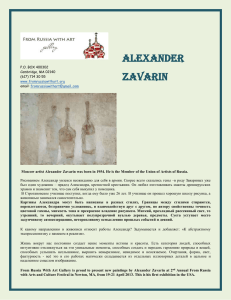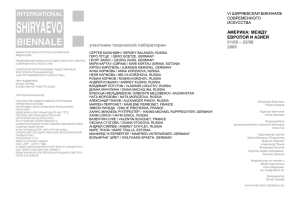Заславская Наталья Значение российской внешней политики для отношений России и Европейского
advertisement

Заславская Наталья Значение российской внешней политики для отношений России и Европейского союза в зарубежных исследованиях. В зарубежных исследованиях, посвященных отношениям России и ЕС, большое внимание уделяется особенностям внешней политики России, ее задачам и принципам, конкретным действиям, процессу принятия внешнеполитических решений. Во многом это связано с тем, что развитие отношений между акторами зависит от их особенностей и внешнеполитических традиций. Так существующие разногласия и противоречия между РФ и Евросоюзом принято объяснять именно различными традициями и приоритетами. К тому же можно вспомнить о том, что некоторые внешнеполитические действия России вызвали критику европейских партнеров и привели к осложнению отношений между РФ и ЕС: в 2008 г. после войны в Южной Осетии сотрудничество между Россией и ЕС было фактически приостановлено на несколько месяцев, в 2014 г. события на Украине разрушили «стратегическое партнерство», привели к «войне санкций» между Россией и ЕС и сделали невозможным дальнейшее сотрудничество. Обзор зарубежных исследований, посвященных влияние российской внешней политики на развитие отношений между Россией и Европейским союзом в сфере безопасности базируется на публикациях в академических журналах (например, Europe-Asia Studies, European Security, Geopolitics, the International Spectator,Journal of Area Studies, Journal of Contemporary European Studies, Problems of Post-Communism, the Washington Quarterly), публикациях исследовательских институтов и центров (например, Института исследования безопасности Европейского союза, Центра европейских политических исследований), сборниках материалов научных конференций (например, конвентов Ассоциации международных исследований) и др. Можно выделить несколько ключевых тем, которые рассматривались в зарубежных публикациях в связи с российской внешней политикой и ее значением для российскоевропейских отношений: (1) российская внешняя политика в целом, (2) российские международные задачи или даже амбиции, (3) конкуренция между Россией и Западом, включая Евросоюз, (4) особенности политического режима в России и значение российских политических лидеров, прежде всего, В.В. Путина и Д.А. Медведева, (5) роль событий в Грузии в 2008 г. и на Украине с 2014 г., (6) конкретные направления российской внешней политики. Так общие тенденции развития внешней политики России рассматриваются в работах В. Барановского, М. Бакли, Л. Дериглазовой, А.Джоунса, Р.А. Джоунса, Л. Карабешкина, Д. Линча, А.С. Макарычева, Дж. Манкоффа, С. Марш, Н. Попеску, С. Секриеру, А. Снетков, Х. Смит, А. Стент, Д. Тренина, Ф. Умбаха, Г. Фэллона, Х. Хауккала, А.П. Цыганкова, С. Шпигелер, Д. Шпехлер.1 В этих работах авторы пытаются объяснить характер российской внешней политики, выявить исторические факторы, повлиявшие на ее формирования, определить особенности восприятия международных проблем. Отдельно можно выделить группу исследований, в которых анализируются внешнеполитические цели Российской Федерации и ее международные амбиции. Эти вопросы рассматриваются в публикациях А.С. Макарычева, Н. Попеску, Ф. Умбаха2. 1 Baranovsky, Vladimir, Russia’s Approach to Security Building in the Euro–Atlantic Zone // The International Spectator, 45(2), June 2010. P.41-53; Buckley , Mary, Russian foreign policy and its critics // European Security, 11 (4), December 2002. P. 29-46; Deriglazova Larisa, Makarychev Andrey S., and Oleg Reut, Russian Foreign Policy: What is not seen from the Kremlin // CEPS Working Document, No. 365, June 2012; Haukkala, Hiski, Lost in Translation? Why the EU has Failed to Influence Russia's Development // Europe-Asia Studies 61(10), 2009. P. 1757-1775; Haukkala, H.,The EU–Russia strategic partnership: the limits of post-sovereignty in international relations. London & New York: Routledge, 2010; Jones, Alan, and Grahame Fallon, The political economy of cooperation, trade and aid between the European Union and Russia // Journal of Contemporary European Studies, 11 (2), November 2003. P. 253-277., Jones , R.A. , The Soviet concept of ‘Limited Sovereignty’ from Lenin to Gorbachev: the Brezhnev Doctrine . Basingstoke : Macmillan, 1990; Karabeshkin, Leonid A., and Dina R. Spechler, EU and NATO enlargement: Russia’s Expectations, Responses and Options for the Future // European Security, 16(3-4), Sept. 2007. P. 307-328; Lynch , Dov, Russia faces Europe // Chaillot Papers No. 60 Paris : Institute for Security Studies, 2003; Makarychev, Andrey S., Rebranding Russia: Norms, Politics and Power //CEPS Working Document No. 283. February 2008; Makarychev Andrey S. In Quest of Political Subjectivity: Russia’s ‘Normative Offensive’ and the Triple Politicisation of Norms //What prospects for normative foreign policy in a multipolar world? // ESF Working paper No 29, July, CEPS, IISS, DCAF & GCSP, 2008. P.14-19; Mankoff, J., Russian foreign policy. The return of great power politics, New York: Rowman and Littlefield, 2009; Marsh, Steve, EURussia Security Relations and the Survey of Russian Federation Foreign Policy: One Year On // European Security. 2008, Vol. 17 Issue 2/3. P. 185-208; Popescu, Nicu, Russia's Soft Power Ambitions // CEPS Policy Brief, No. 115, 26 October 2006; Secrieru, Stanislav, Russian Foreign Policy in Times of Crisis: Greater compliance or resilient self-confidence? // CEPS Policy Brief No. 192/30 June 2009; Smith, Hanna, Russian foreign policy, regional cooperation and northern relations // The New Northern Dimension of the European Neighbourhood. CEPS, 2008. P.19-35; Snetkov, Aglaya, When the Internal and External Collide: A Social Constructivist Reading of Russia's Security Policy // Europe-Asia Studies, 64 (3), 2012. P. 521-542; Trenin, Dmitri, Russia Redefines Itself and Its Relations with the West // The Washington Quarterly, 30 (2), April 2007. P. 95-105; Trenin, Dmitri, Russia and global security norms // The Washington Quarterly, 27(2), March 2004. P. 61-77; Trenin, Dmitri, No Return to the Past for Russia // The International Spectator, 47 (3), September 2012. P. 8-12; Trenin, Dmitri, A Russia-within-Europe: Working towards a New Security Arrangement // Russia's Security Policy and EURussian Relations. ESF Working Paper No. 6 March, 2002. P. 1-6; Trenin, Dmitri, De Spiegeleire, Stephan, and Angela Stent, Russia's Security Policy and EU-Russian Relations // ESF Working Paper No. 6 March, 2002; Tsygankov, Andrei P., Finding a Civilisational Idea: “West,” Eurasia,” and “Euro-East” in Russia’s Foreign Policy // Geopolitics, 12 (3), July 2007. P. 375-399; Umbach, Frank, Russia as a ‘virtual great power’: Implications for its declining role in European and Eurasian security // European Security, 9 (3), Sept. 2000. P. 87-122. 2 Makarychev, Andrey S., Rebranding Russia: Norms, Politics and Power //CEPS Working Document No. 283. February 2008; Makarychev Andrey S. In Quest of Political Subjectivity: Russia’s ‘Normative Offensive’ and the Triple Politicisation of Norms //What prospects for normative foreign policy in a multipolar world? // ESF Working paper No 29, July, CEPS, IISS, DCAF & GCSP, 2008. P.14-19; Popescu, Nicu, Russia's Soft Power Ambitions // CEPS Policy Brief, No. 115, 26 October 2006; Umbach, Frank, Russia as a ‘virtual great power’: Implications for its declining role in European and Eurasian security // European Security, 9 (3), Sept. 2000. P. 87-122. Во многих зарубежных исследованиях авторы рассматривают проблему конкуренции между Россией и Западом, их ценностями и интересами, соперничеством между Россией и Евросоюзом в нормативной сфере. Подобные вопросы затрагиваются в работах Д. Аверре, Д. Босолд, К. Брокман, Л. Карабешкина, А.С. Макарычева, Л. Марча, Т. Казира, В. Морозова, И. Нойманна, Д. Тренина, П. Флинли, Т. Форсберга, Х. Хауккала, М. Эмерсона.3 Еще одно популярное направление изучения российской внешней политики за рубежом связано с анализом особенностей политического режима в России, процесса принятия политических решений и роли лидеров в этом процессе. Особое внимание сторонники данного подхода уделяют политическим приоритетам В.В. Путина и Д.А. Медведева и основным направлениям их внешнеполитической деятельности. К этому направлению можно отнести публикации И. Бусыгиной, Дж. Говер, А. Джоунса, М. Лайт, А.С. Макарычева, Л. Марча, К. Пинноньеми, С. Уайта, Г. Фэлон, Р. Эллисона4. Наиболее внимательно в зарубежных исследованиях рассматривается российская политика в отношении «Общих соседей», прежде всего, Грузии и Украины, поскольку 3 Averre, D., Russian Foreign Policy and the Global Political Environment, Problems of Post-Communism, 55 (5). 2008; Averre, D.,Competing Rationalities: Russia, the EU and the ‘Shared Neighbourhood’// Europe–Asia studies, 61(10), 2009. P. 1689–1713; Brockmann, K. and Bosold, D. (eds.) Democratization and Security in Central and Eastern Europe and the Post-Soviet States, 12th DGAP New Faces Conference, Prague, 16 – 18 March, 2009. P.3337; Casier, Tom, The EU–Russia Strategic Partnership: Challenging the Normative Argument // Europe-Asia Studies, 65 (7), September 2013. P. 1377-1395; Emerson, Michael, Russia in Europe and the West //CEPS Commentary, 01 April 2010; Flenley, Paul, Russia and the EU: The Clash of New Neighbourhoods? // Journal of Contemporary European Studies, 16 (2), August 2008. P. 189-202; Forsberg, Tuomas, and Hiski Haukkala, The End of an Era for Institutionalism in European Security? // Journal of Contemporary European Studies, 23(1). Special Issue: Russia and the Major European Institutions. 2015. P. 1-5; Haukkala, Hiski, The Russian Challenge to EU Normative Power: The Case of European Neighbourhood Policy // The International Spectator , 43(2), 2008. P. 35-47; Karabeshkin, Leonid A., and Dina R. Spechler, EUand NATO enlargement: Russia’s Expectations, Responses and Options for the Future // European Security, 16(3-4), Sept. 2007. P. 307-328; Makarychev, Andrey S., Rebranding Russia: Norms, Politics and Power //CEPS Working Document No. 283. February 2008; Makarychev Andrey S. In Quest of Political Subjectivity: Russia’s ‘Normative Offensive’ and the Triple Politicisation of Norms //What prospects for normative foreign policy in a multipolar world? // ESF Working paper No 29, July, CEPS, IISS, DCAF & GCSP, 2008. P.14-19; March, L., Security strategy and the “Russia problem” // Dannreuther, R. and Peterson, J. (eds.), Security strategy and transatlantic relations, New York, Routledge, 2006. P. 98-103; Morozov, V., Russia and the West: Dividing Europe, Constructing Each Other, paper presented at the ISA Annual Convention, Chicago, February 28 – March 3, 2007; Neumann, Iver B., Russia as Europe's other // Journal of Area Studies, 6 (12), March 1998. P. 26-73; Trenin, Dmitri, Russia Redefines Itself and Its Relations with the West // The Washington Quarterly, 30 (2), April 2007. P. 95-105. 4 Allison, R.; Light, M.; White, S., Putin‟s Russia and the Enlarged Europe, London, Chatham House/Blackwell Publishing. 2006; Gower, Jackie, European Union-Russia Relations at the End of the Putin Presidency // Journal of Contemporary European Studies, 16(2), August 2008. P. 161-167.; Jones, Alan, and Grahame Fallon, The political economy of co-operation, trade and aid between the European Union and Russia // Journal of Contemporary European Studies, 11 (2), November 2003. P. 253-277; Makarychev Andrey, Farewell to the liberal technocrat? Reassessing Medvedev’s foreign policy legacy // CEPS Commentary, 1 March 2012; March, L., Security strategy and the “Russia problem” // Dannreuther, R. and Peterson, J. (eds.), Security strategy and transatlantic relations, New York, Routledge, 2006. P. 98-103; Pynnöniemi, Katri, and Irina Busygina, Critical infrastructure protection and Russia’s hybrid regime // European Security, 22 (4), Dec. 2013. P. 559-575. российские действия в отношении Грузии в 2008 г. и политика в отношении Украины, начиная с 2014 г., вызвали резкую критику со стороны Евросоюза и стран-членов ЕС и негативно повлияли на характер отношений между Россией и Евросоюзом. Ученые пытаются объяснить действия России и обосновать негативную реакцию Европейского союза на действия «стратегического партнера». Среди авторов, изучающих последствия событий в Грузии и на Украине для отношений России и ЕС, такие исследователи, как М.И. Беккер, Дж. Говер, М. Дэвид, М.С. Коуен, С. Куши, Я.П. МкМанус, Т. Форсберг, Х. Хауккала, Р. Эллисон5. Наконец, в некоторых публикациях уделяется внимание определенным региональным приоритетам российской внешней политики, тому, как Россия выстраивает свою внешнеполитическую деятельность в различных регионах, и влиянию географических приоритетов России на отношения с Евросоюзом. Подобные вопросы затрагиваются в публикациях В. Барановского, Х. Костяняна, А.С. Макарычева, Х. Хауккала, М. Эмерсона, Т. Этзольда.6 Безусловно, исследователи уделяют большое внимание российской внешней политики, изучают ее влияние на развитие отношений между Россией и Европейским союзом. В данном обзоре была предпринята попытка выявить наиболее значимые тенденции и определить основную тематику подобных исследований. Конечно список публикаций, проанализированных в данном обзоре, не является исчерпывающим, но рассмотренные научные исследования позволяют сделать выводы о характере зарубежных исследований. 5 Allison, Roy, The Russian case for military intervention in Georgia: international law, norms and political calculation // European Security, 18(2), June 2009. P. 173-200.; Allison, R., Russia, the west, and military intervention. Oxford: Oxford University Press. 2013; Becker, Michael E., Cohen, Matthew S., Kushi, Sidita, and Ian P. McManus, Reviving the Russian empire: the Crimean intervention through a neoclassical realist lens // European Security 2016, vol. 25 no 1. P. 112-133; David, Maxine, Gower, Jackie, and Hiski Haukkala, Introduction: The European Union and Russia // Journal of Contemporary European Studies, 19 (2), June 2011. P. 183-188; Forsberg, Tuomas, and Hiski Haukkala, The End of an Era for Institutionalism in European Security? // Journal of Contemporary European Studies, 23(1). Special Issue: Russia and the Major European Institutions. 2015. P. 1-5; Haukkala, Hiski, From Cooperative to Contested Europe? The Conflict in Ukraine as a Culmination of a Long-Term Crisis in EU–Russia Relations // Journal of Contemporary European Studies, 23 (1), January 2015. P. 25-40. 6 Baranovsky, Vladimir, Russia’s Approach to Security Building in the Euro–Atlantic Zone // The International Spectator, 45(2), June 2010. P.41-53; Emerson Michael, Kostanyan Hrant, The Implications of Eurasian Integration for the EU’s Relations with the Countries in the Post-Soviet Space // Series: CEPS Commentary, 4 Nov 2015; Etzold, Tobias, and Hiski Haukkala, Is There a Nordic Russia Policy? Swedish, Finnish and Danish Relations with Russia in the Context of the European Union // Journal of Contemporary European Studies, 19 (2), June 2011.P. 249-260; Makarychev Andrey S., Russia and its 'New Security Architecture' in Europe: A Critical Examination of the Concept // CEPS Working Document No. 310/February 2009.
